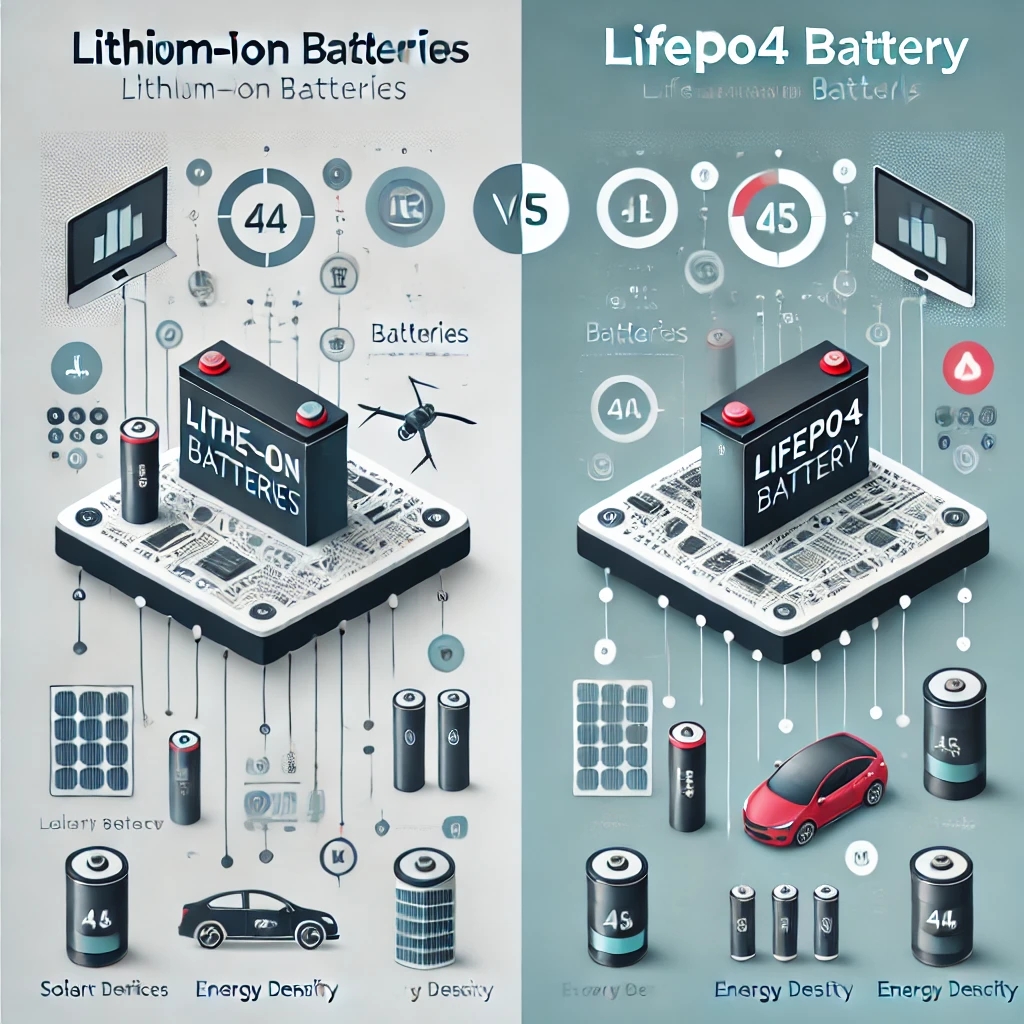





+86-13828714933

rome_jia@yabopower.com
Lithium Ion Battery VS LiFePO4 Batteries
来源:
|
作者:Valarie
|
发布时间 :2024-11-22
|
32 次浏览:
|
Share:
As the demand for sustainable energy continues to grow, advancements in battery technology have become a global focus. Companies like YABO Power are leading the charge, specializing in the development and production of high-performance batteries. However, when it comes to choosing between Lithium-Ion Batteries and LiFePO4 Batteries, many consumers and businesses find themselves at a crossroads. This article compares the two technologies, helping you understand their advantages, disadvantages, and ideal applications.
Lithium Ion Battery VS LiFePO4 Batteries
As the demand for sustainable energy continues to grow, advancements in battery technology have become a global focus. Companies like YABO Power are leading the charge, specializing in the development and production of high-performance batteries. However, when it comes to choosing between Lithium-Ion Batteries and LiFePO4 Batteries, many consumers and businesses find themselves at a crossroads. This article compares the two technologies, helping you understand their advantages, disadvantages, and ideal applications.
What Is a Lithium-Ion Battery?
Lithium-Ion Batteries are widely used in consumer electronics, portable power supplies, and electric vehicles. They are known for their high energy density, lightweight design, and relatively long charge-discharge cycles. YABO Power's lithium-ion battery series excels in performance and efficient energy storage, making it ideal for applications that demand high power and compact designs, such as laptops, smartphones, and drones.
Lithium-Ion Batteries are widely used in consumer electronics, portable power supplies, and electric vehicles. They are known for their high energy density, lightweight design, and relatively long charge-discharge cycles. YABO Power's lithium-ion battery series excels in performance and efficient energy storage, making it ideal for applications that demand high power and compact designs, such as laptops, smartphones, and drones.
What Is a LiFePO4 Battery?
In contrast, LiFePO4 Batteries are a type of lithium battery designed for higher safety and longer lifespan. YABO Power's expertise extends to this domain, offering LiFePO4 batteries widely used in solar energy storage, electric vehicles, and home energy storage systems. Thanks to their stable chemical structure, these batteries perform exceptionally well in high-temperature environments and are virtually immune to thermal runaway, making them a top choice for safety-conscious consumers.
In contrast, LiFePO4 Batteries are a type of lithium battery designed for higher safety and longer lifespan. YABO Power's expertise extends to this domain, offering LiFePO4 batteries widely used in solar energy storage, electric vehicles, and home energy storage systems. Thanks to their stable chemical structure, these batteries perform exceptionally well in high-temperature environments and are virtually immune to thermal runaway, making them a top choice for safety-conscious consumers.
Performance Comparison: Lithium Ion Battery VS LiFePO4 Batteries
·Energy Density
Lithium-Ion Batteries offer higher energy density, delivering more power per unit weight, which is ideal for space-constrained applications. However, LiFePO4 Batteries have slightly lower energy density, resulting in a larger size.
·Lifespan
For those seeking a long-lasting battery, LiFePO4 Batteries are undoubtedly better. YABO Power's LiFePO4 batteries have a cycle life of 4,000–6,000 cycles, compared to the typical 500–1,000 cycles of standard lithium-ion batteries.
For those seeking a long-lasting battery, LiFePO4 Batteries are undoubtedly better. YABO Power's LiFePO4 batteries have a cycle life of 4,000–6,000 cycles, compared to the typical 500–1,000 cycles of standard lithium-ion batteries.
·Safety
Safety is a critical factor. LiFePO4 Batteries, with their stable chemistry, are almost immune to overheating, fires, or explosions. This makes them ideal for electric vehicles, solar systems, and outdoor equipment. In comparison, while Lithium-Ion Batteries are high-performing, they are more sensitive to overcharging, deep discharges, and high temperatures.
Safety is a critical factor. LiFePO4 Batteries, with their stable chemistry, are almost immune to overheating, fires, or explosions. This makes them ideal for electric vehicles, solar systems, and outdoor equipment. In comparison, while Lithium-Ion Batteries are high-performing, they are more sensitive to overcharging, deep discharges, and high temperatures.
·Cost
In terms of initial cost, Lithium-Ion Batteries are typically cheaper. However, in the long run, LiFePO4 Batteries are more economical due to their longer lifespan and lower maintenance requirements.
In terms of initial cost, Lithium-Ion Batteries are typically cheaper. However, in the long run, LiFePO4 Batteries are more economical due to their longer lifespan and lower maintenance requirements.
·The Final Verdict
The ultimate choice depends on your specific needs. If you require a lightweight, high-performance battery, Lithium-Ion Batteries are the way to go. However, if safety, longevity, and stability are your priorities, LiFePO4 Batteries are the superior option. Regardless of your choice, manufacturers like YABO Power offer top-tier solutions to meet your energy needs.
The ultimate choice depends on your specific needs. If you require a lightweight, high-performance battery, Lithium-Ion Batteries are the way to go. However, if safety, longevity, and stability are your priorities, LiFePO4 Batteries are the superior option. Regardless of your choice, manufacturers like YABO Power offer top-tier solutions to meet your energy needs.
·Looking Ahead
With ongoing advancements in technology, battery performance continues to improve. As a leader in the industry, YABO Power remains dedicated to developing more efficient and eco-friendly battery technologies. Whether you choose LiFePO4 Batteries or Lithium-Ion Batteries, YABO Power will continue to provide safe, reliable, and sustainable energy solutions for customers worldwide.
With ongoing advancements in technology, battery performance continues to improve. As a leader in the industry, YABO Power remains dedicated to developing more efficient and eco-friendly battery technologies. Whether you choose LiFePO4 Batteries or Lithium-Ion Batteries, YABO Power will continue to provide safe, reliable, and sustainable energy solutions for customers worldwide.
From powering electric vehicles to supporting home energy storage systems, selecting the right battery technology will determine the efficiency and safety of future energy use. With YABO Power , you have a trusted partner to guide you every step of the way.

-----author:Valarie

Shenzhen Yabo Power Technology Co., Ltd.
Quick Links
Product Categories
Contact us
rome_jia@yabopower.com
+86-13828714933
No.252 Pinglong East Road, Fenghuang Community, Pinghu Street, Longgang District, Shenzhen
© 2024 Shenzhen Yabo Power Technology Co., Ltd. All Rights Reserved. Designed by Erge







